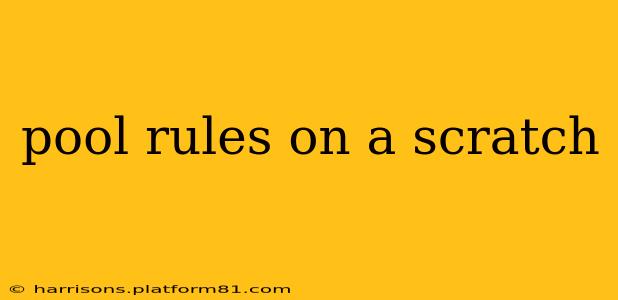Pool, or pocket billiards, is a game of skill and strategy, but it also relies on a clear understanding of the rules. One crucial aspect is understanding what happens on a scratch—when you accidentally pocket your cue ball. This guide will delve into the various rules surrounding scratches in pool, clarifying common points of confusion and ensuring a fair and enjoyable game for all players.
What Happens When You Scratch in Pool?
A scratch occurs when your cue ball is pocketed, goes off the table, or contacts anything outside the playing surface during your turn. The consequences of a scratch vary depending on the specific game being played (8-ball, 9-ball, etc.) and whether you've already pocketed any balls.
Generally, scratching results in your opponent receiving some form of advantage. This might involve:
- Opponent gets ball in hand: This is the most common penalty. Your opponent gets to place the cue ball anywhere on the table to begin their turn.
- Opponent gets cue ball in hand behind the head string: A slightly less advantageous penalty, confining the placement of the cue ball to the area behind the head string (the line across the table).
- Opponent gets cue ball in hand behind the head string and a free shot on any other ball: This penalty combines the ball-in-hand rule with a free shot on a legal ball.
- Loss of turn without penalty: In some variations of play, the only penalty for scratching is the loss of your turn.
Common Pool Game Variations and Scratch Rules
Let's break down how scratching impacts different pool games:
8-Ball
In 8-ball, the consequences of a scratch significantly impact the game's flow. If you scratch after pocketing at least one of your object balls, your opponent usually gets ball in hand. If you scratch before pocketing any balls, the rules might vary depending on your local game, but often it also results in ball in hand for your opponent.
9-Ball
9-ball has a different dynamic. If you scratch, your opponent almost always gets ball in hand, regardless of whether you've pocketed any balls.
Other Pool Games
Other pool games, like 1-ball, straight pool, or rotation, may have specific rules regarding scratches. Always clarify the rules for these variations before the game begins.
What If I Scratch on My Break?
The break shot is often treated differently. Many pool halls and leagues have unique rules for breaks. Usually, if you scratch on the break, you might only forfeit your turn without a ball-in-hand penalty for your opponent. Other times, a complete re-rack might be required. Always check the specific rules of the establishment or league before starting.
Can I Avoid a Scratch?
While there's no foolproof method, skillful play and a strategic approach can help minimize the risk of scratches.
- Develop good cueing technique: This improves accuracy and control, reducing the chances of hitting the cue ball too hard or at the wrong angle.
- Practice your shots: Regular practice builds your confidence and allows you to anticipate the trajectory of the cue ball.
- Choose your shots wisely: Don't take unnecessary risks. It's better to play a safer shot than attempt a difficult one that might lead to a scratch.
How Do I Know the Specific Rules?
If unsure, always ask your opponent before the game starts! Clear communication is key to an enjoyable and fair match. Additionally, consult the rules posted at your local pool hall. These often clarify ambiguities in the rules.
Conclusion
Understanding the rules on scratching in pool is essential for fair play and a positive gaming experience. Remember to clarify any ambiguities before the match begins and enjoy the game!
